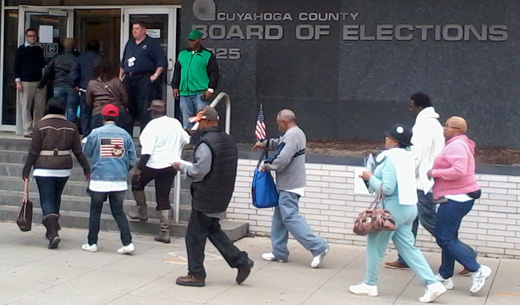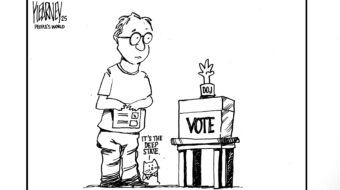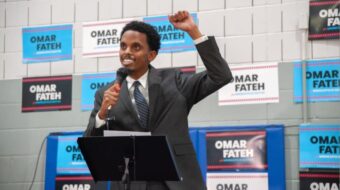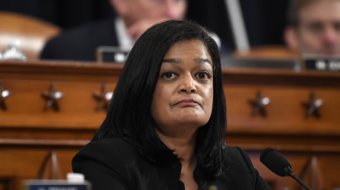
CLEVELAND – Defying ongoing obstruction by Republican Secretary of State Jon Husted, crowds gathered at election boards early Tuesday morning, waiting for the doors to open on the first day of early voting in Ohio in the critical Nov. 6 presidential election.
First in line at the Cuyahoga County Board here was state Senator Nina Turner, who, despite continual rain, was among those camping out all night in tents on the sidewalk. Other “Sleep Out the Vote” actions took place in Columbus, Cincinnati, Youngstown and Toledo.
“Vote in the interest of working class people,” Turner told the buoyant crowd. “We must help President Barack Obama make history and build our economy from the middle class out, not from the top down. Trickle down does not work except for the ultra-wealthy.”
Citing the rescue of the auto industry, the Affordable Care Act, the defense of “women’s rights, voters’ rights and workers’ rights,” she said to loud applause, “It’s better to have a president who’s trying rather than a person who is lying.”
“Vote in your own best interest,” Turner said. “Make sure this state goes blue for President Obama.”
As the doors opened she walked in to vote together with Mayor Frank Jackson, other public officials and supporters.
“Early voting is very important,” Jackson said. “We have a clear choice in this election. It will decide the future of our urban centers.”
U.S. Senator Sherrod Brown arrived and spoke to a crowd of bus drivers, members of the Amalgamated Transit Union, who were having a national voter mobilization conference. The union had selected Cleveland and Denver, the largest cities in two key battleground states, for special attention as part of a national effort “to mobilize our members and riders at bus stops throughout the country,” said President Larry Hanley. “We plan to have 10,000 members in the streets until Nov. 6 to show just how sacred the right to vote is.”
Many riders, Hanley said, “are low income and oppressed. They don’t have driver’s licenses and they use public transit.”
Soon after, two church buses with voters from the huge Word Church arrived.
“It’s imperative for us to vote,” said Pastor R.A. Vernon, a member of Laborers Local 310. “People died for me to have that right.”
A steady stream of voters continued throughout the day, reaching 10 times the 72 who voted at the board on the first day of early voting in 2008.
They included Congresswoman Marcia Fudge and 83-year-old Charlie Mae Sinclair, who spent an hour and a half filling out her ballot and said she was voting early, “because I have that privilege and I want to part of the solution.” Also voting was 19-year-old Stephanie, a student who walked to the board from nearby Cleveland State University.
She said she was voting at the board “since it was so convenient.”
Husted has continued efforts to impede the process despite rebuffs in court. He made it
harder for workers to vote early by limiting access to election boards to work hours. But
a federal court ruled unconstitutional his effort to ban voting at the election boards on the three days prior to the election, when in-person early voting is highest. Fifty-six percent of those who did vote on those days in Cuyahoga County in 2008 were African American. GOP Attorney General Mike DeWine has appealed that ruling despite calls, including from the Plain Dealer and other newspapers, to drop the issue.
“Their attempt to suppress the vote is all about race and class,” Turner declared.
Aside from voting in person at county election boards, most early voting occurs by mail. Cuyahoga County reported receiving a record 190,000 mail ballot applications as of Oct. 1. Over 900,000 mail ballots have been requested statewide, according to Husted. Voters should get these ballots by the end of the week and ballots will continue to be sent out as more applications arrive until a few days before Nov. 6.
The latest controversy concerns Husted’s directive banning election boards from contacting voters to correct minor discrepancies on information they put on the identification envelopes containing their mail-in ballots. Under the directive, if voters forget to sign the envelope or enter an incorrect zip code for their address, their ballots would be discarded.
Cuyahoga County Board Members Eben McNair and Inajo Chappell, both Democrats, wrote to Husted Sept. 28 asking him to change the directive which they said risks disenfranchising some 1,300 voters in the county and 8,400 statewide. They also expressed concern that the directive would be applied inconsistently from one county to another.
Photo: Early voters entering Cuyahoga County Board of Elections office, Rick Nagin/PW










